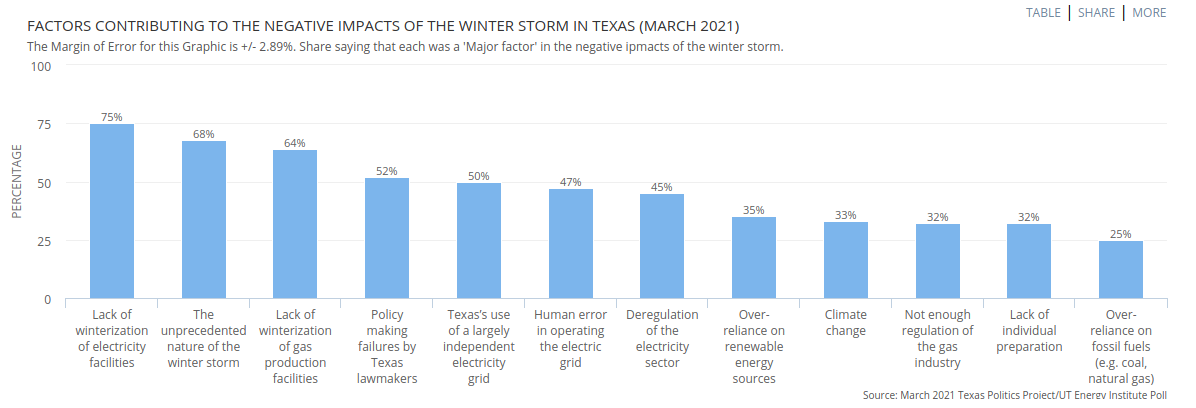Polling shows why looming winter weather triggers Texans' anxieties about the grid, and their doubts about political leaders' response
As the first serious winter storm descends on their state, Texans’ pervasive anxiety about the reliability of the state’s go-it-alone power grid has floated to the surface of public discussion like a North Atlantic iceberg. Weather forecasters and energy mavens assure us that the weather hitting a large swath of the state lacks the severity, duration, or geographic impact of the February 2021 disaster that left hundreds dead, millions of Texas without power in sub-freezing temperatures, and caused billions in damage. Polling we conducted both shortly after the 2021 outages and in the intervening months suggest that the seemingly widespread anxiety about the return of cold weather reflects the pervasive impact of the last storm, as well as a lack of confidence in the state leadership’s measures to ensure the reliability of the grid in the wake of last year’s failures.
The results of a Texas Politics Project/UT Energy Institute poll conducted just a few weeks after the February outages illustrates why the public is walking on eggshells when it comes to the reliability of the grid. As we recounted in an overview of the poll last year:
- 66% of those surveyed reported their electricity stopped working during the storm.
- Of those who reported electricity outages, 49% reported being without electricity for 1 to 3 days, and 28% without power for between 4 and 7 days.
- 56% reported not having reliable internet access in their home.
- 53% reported having to obtain drinking water.
- 30% reported lost income from not being able to go to work.
- 40% reported an electricity bill that was higher than normal.
At the time, Texans’ recognized the unique nature of the conditions that led to the outages, but were also nearly as likely to attribute responsibility to policy factors and industry behavior, particularly the winterization of electric and gas production facilities – both of which remain at the forefront of contentious policy discussions amid simmering conflict within the energy sector between electric providers and the natural gas producers – all under the watchful eye of a governor seeking re-election.

The legislature held high profile hearings and passed complex legislation meant to address reliability issues, while the Governor engineered the turnover of the membership of the Public Utility Commission (PUC) and the leadership of the Electric Reliability Council of Texas (ERCOT). Yet our polling during and after the extended special session found Texans skeptical of the state leadership’s actions, and on a somewhat bipartisan basis: In April polling, only 17% of Texas voters, including 30% of Republicans and 7% of Democrats said that they were either extremely or very confident that the legislature would enact effective laws to prevent future disruptions in utility services like the one caused in February 2021. By June, the share expressing the same degree of confidence had declined to 13%, including 7% of Democrats and only 19% of Republicans. Likely informed by these dour assessments, the share of voters approving of how state leaders and the legislature have handled the reliability of the electric grid in Texas decreased from 22% in June at the end of the regular session, to 18% by October. While it’s easy to imagine partisanship driving these dynamics, the share of Republican voters willing to express disapproval of state leadership’s handling of the grid increased from 34% in June polling to 45% in October.
Given that Republicans’ long dominance of all branches of elected and appointed offices make GOP incumbents the sole owners of energy policy in the state, the reliability of the grid has been a political issue from the first flickering of the lights in 2021. Governor Abbott made news Wednesday when he hedged his bets after widely-covered assurances that “I can guarantee the lights will stay on” on Fox 7 Austin last November. By this week, as the weather forecasts worsened, Abbott backtracked into more reasonable territory, saying at a press conference Tuesday urging the public to be prepared for the storm, that "no one can guarantee that there won't be a 'load shed event.'”
Reasonable and even public-minded as this position is under the circumstances, it highlighted his earlier hyperbole. In strictly political terms, it’s a reasonable bet that the alignment of factors that made the 2021 outages so disastrous amount to a pretty low-probability event, and was unlikely to be repeated on the same scale between now and the November elections (or even the March primary). But going all-in with a blanket guarantee underestimated the public’s sensitivity to disruptions on any significant scale. The threshold for triggering political costs to the governor and other GOP incumbents is significantly lower now. The ship can take on some water even if doesn’t have hit the iceberg head-on.
This dynamic is amplified in an election year in which Gov. Abbott’s opponents on both the left and the right have sought to hang the outages and the response to them around the Governor’s neck. As was widely noted at the time of his initial statements, his overpromising set him up for criticism. The Abbott campaign can’t be surprised that the word “backtrack” appeared prominently in some coverage, amidst a report by Mitchell Ferman in The Texas Tribune that on a call organized by ERCOT, officials informed participants that that “gas suppliers have already begun notifying electricity generation companies that some of their expected gas supply will not arrive this week during the freezing weather.” You can feel the political-PTSD kicking in from here.
For more results from the Texas Politics Project/UT Energy Institute poll conducted in March 2021, see the Texas Politics Project polling data archive, and an earlier post that accompanied release of the poll.
